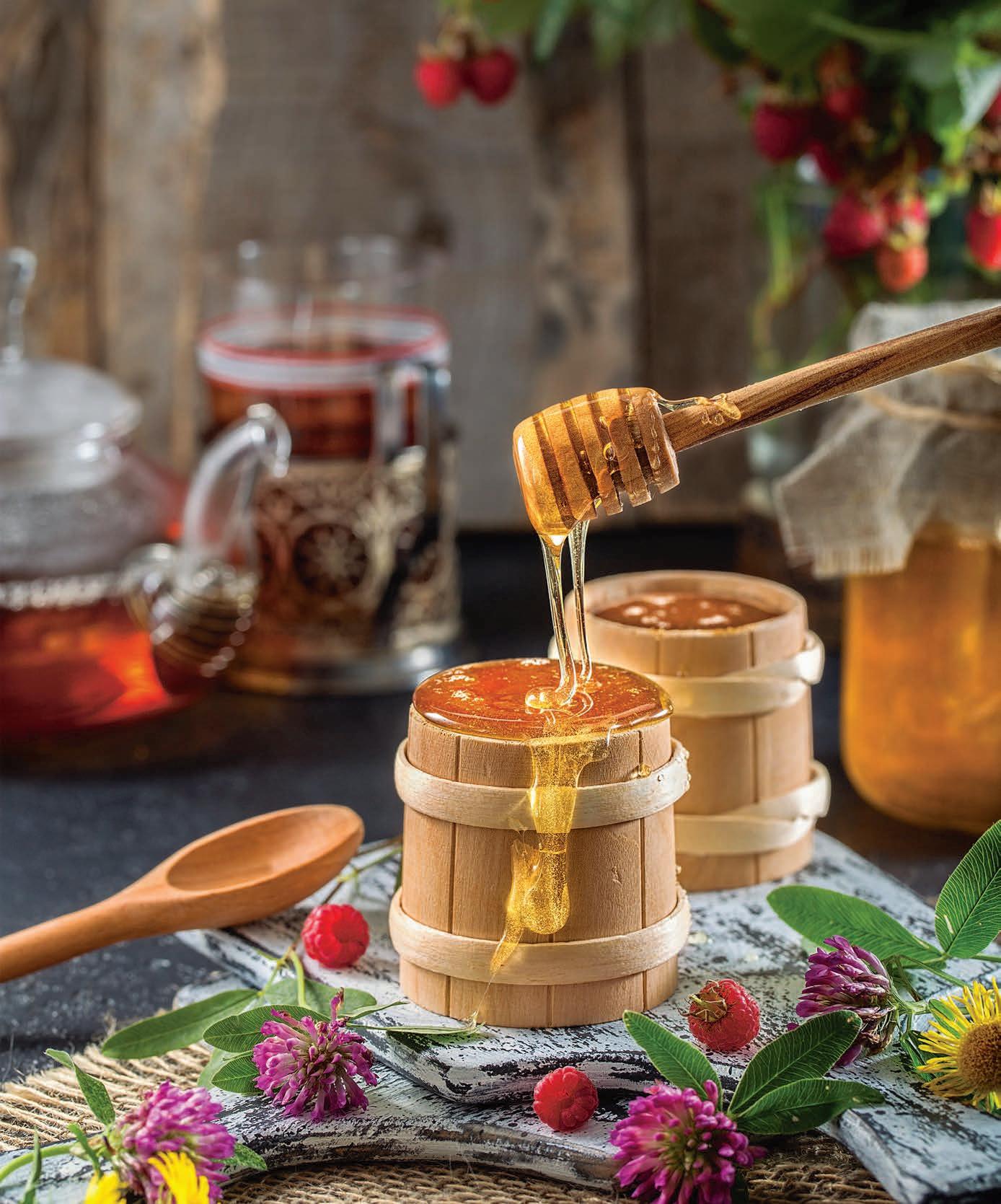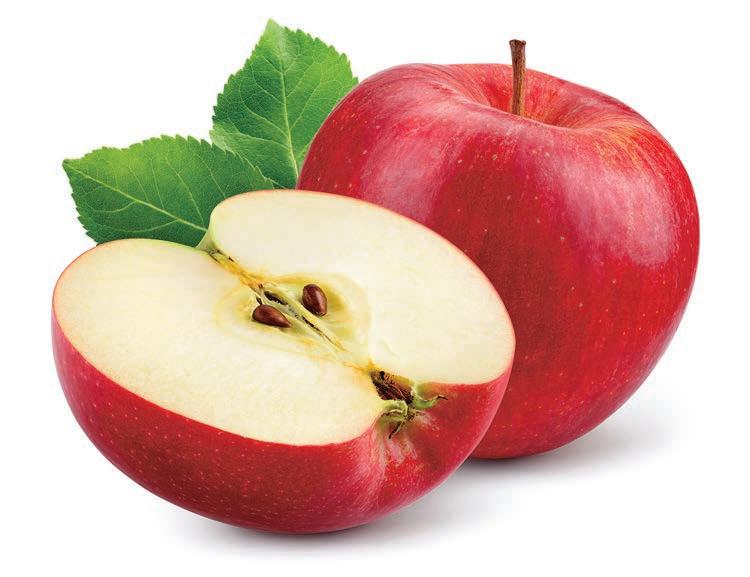
10 minute read
Maybe Mom Was Right
When it comes to self-care, a good place to start is with the advice given by our mothers and grandmothers. Whether handed down as “old wives’ tales” or sound advice learned through experience, there are true kernels of wisdom to be found. Here are some that relate to health and home remedies.
Bundle Up
Although a Golden Isles winter isn’t exactly the same as what our friends experience in the more northern climates, it still brings to mind cold weather warnings from our well-meaning mothers and grandmothers. “Bundle up and stay warm,” they told us. “Don’t go out with wet hair or you’ll catch your death of cold!” We laughed them off as we got older, knowing colds are all about viruses and have nothing to do with weather. But maybe they were right all along.
There is scientific evidence that being exposed to colder temperatures can make us more likely to catch a cold. One study has shown that participants who sat with their feet in cold water were more likely to report cold symptoms five days after the exposure than participants in a control group who did not have contact with cold water. Researchers suggest that these results indicate that exposure to cold may suppress the immune response to some degree, potentially increasing the likelihood you’ll get sick in the days after you were exposed to cold conditions. Similarly, if your immune system is not strong, getting a chill from wet hair or not being dressed adequately for colder temperatures could stress the immune system of those at risk, making one more prone to illness. Now, bundle up appropriately when the mercury drops and apologize to your mother for all those times you ignored her advice!
How about the idea that winter and cold temperatures make colds and flu worse? Colds and flu may be more prevalent in winter because cold weather causes us to spend more time indoors and around other people, possibly increasing our risk of exposure. Colder temperatures may also help viruses replicate more easily. There’s also an argument that our Vitamin D levels drop as sun exposure wanes in the winter months and contributes to seasonal illness. At the very least, that gives us great incentive to get outside and enjoy the sunshine as much as we possibly can!
Eat Your Chicken Soup
Another bit of advice handed down through the ages is eating chicken soup to cure a cold. Since it’s important to stay hydrated and get nutrients into your body when you’re ill, experts agree that chicken soup is a good option, especially when eating a solid meal may be too much to stomach.
“Chicken soup can offer a nutrient-dense food option when someone is struggling with a poor appetite,” said Kristen Smith, a registered dietitian and spokeswoman for the Academy of Nutrition and Dietetics. “It can also help increase hydration during a time when this could be a challenge.” Smith added that most chicken soups contain ingredients that provide vitamins and minerals. For example, carrots provide your body with vitamin A, a nutrient that plays a role in the immune response. Chicken stock contains zinc, which may help fight a cold when consumed in high amounts. Chicken may also help with the repair of body tissue because it contains the amino acid cysteine, which some researchers are exploring for improving colds in supplement form. Most homemade and canned varieties of chicken soup would probably not provide adequate amounts of zinc or cysteine to offer significant health benefits. It’s also been suggested that collagen from chicken stock or bone broth can help with healing.


Over the years, numerous researchers have attempted to study the effects of chicken soup on those sick with respiratory infections. According to one of these studies from the University of Nebraska Medical Center, homemade chicken soup can in fact help to reduce inflammation, which is responsible for many of the unpleasant symptoms associated with an infection. Hot fluids and the steam they release are helpful in relieving congestion, so even if the soup isn’t a “cure,” it can make a person with a cold feel better.

If someone is taking care of you when you’re sick and preparing chicken soup for you, just that tender loving care has a beneficial effect. That nurturing has genuine results and the way it can make you feel better is not a placebo effect, but the contents of the soup they are making may be irrelevant. So, eat the soup, and enjoy any TLC offered when you’re sick. If you’re feeling the need to do some nurturing of your own (which can be fabulous for your own well-being), you’ll find several delicious soup recipes on the Elegant Island Living website under the Community Cookbook tab, including a tried and true Mexican chicken soup (Caldo de Pollo) and a Greek lemon chicken soup (Avgolemono) that has the added benefit of some Vitamin C.
An Apple a Day Keeps the Doctor Away
The saying “An apple a day keeps the doctor away,” was first coined in 1913, but originated in Wales in 1866 where it was published in this rhyming format: “Eat an apple on going to bed and you’ll keep the doctor from earning his bread.” From that time on, the apple has come to symbolize good health and healthy habits, often used by government and private health organizations to symbolize lifestyle choices that lead to improved health and wellness. But does eating an apple a day really result in better health?
There’s no question that apple consumption has beneficial effects. The US Apple Association and other groups have touted the health benefits of the fruit’s fiber content, essential vitamins and minerals, and flavonoids, a group of molecular compounds thought to be helpful in the prevention of cancer and other health conditions. Throughout the years, various studies have shown apple consumption to be linked to weight loss, improved cardiovascular health, prevention of neurologic degradation, cancer suppression, and even reduction in asthma symptoms. Arguably, eating many other types of fruit may have similar health benefits, but it is worth noting that apples have more fiber than grapes, melon, or mango, and twice as much Vitamin A as pears. When it comes to vitamin C, oranges and bananas top the apple, and blueberries have more folate and antioxidant properties. Apples also contain a special phytochemical, most concentrated in its skin, that can help regulate digestion and improve blood glucose control.
A U.S. study conducted in 2015 actually tested the old adage, using diet survey data for 8,000 apple-eating and non-apple eating adults, comparing the number of doctor’s visits, overnight hospital stays and prescription medicines. That study found that those who ate at least one apple per day (either whole, or as part of other foods) were slightly less likely to need a GP visit or medication. But the final analysis led to the conclusion that these results likely weren’t specifically related to the apples, but the overall health habits of the people who eat apples. Even if eating an apple a day doesn’t keep the doctor away, apples, especially when consumed along with plenty of other fruits and vegetables in your daily diet, certainly can contribute to your overall health and wellness.
Honey Cures a Cough
Many people look to natural remedies instead of over-the-counter medications or prescriptions these days. A time-honored natural way to soothe a sore throat is drinking hot tea or lemon water with honey. For adults, a splash of whiskey doesn’t hurt either! Honey alone has been proven to be an effective throat coat and cough suppressant.
In a study of children ages one- to fiveyears-old with upper respiratory tract infections, their nighttime coughing reduced and sleep improved when they were given up to two teaspoons of honey at bedtime. It was also deemed to be as effective as dextromethorphan, a leading cough suppressant ingredient in typical over-thecounter doses. Since the American Academy of Pediatrics has reported that cough and cold medicines often don’t work in children younger than 6, honey can be an effective and safe option for relief for children aged 1-6. Honey should never be given to children under a year old because of the risk of infant botulism, a rare but serious form of food poisoning. But if your toddler or pre-K child is
has a persistent nagging cough at bedtime, a couple spoonfuls of honey may be the sweetest way to help them get a good night’s sleep.
Cucumbers Cure Puffy Eyes
Nobody likes dark circles and puffy eyes, so eye creams and serums are widely available. And while there may be a million-andone treatment
options, perhaps one of the best methods is one of the oldest: cucumbers. They’re an easy, natural, and inexpensive fix.
Cucumbers are made up of approximately 95% water, so they are excellent for hydrating for the skin both when used topically and when ingested. Cucumbers also contain high levels of lignans, cucurbitacins, flavonoids, antioxidants, and other trace elements and minerals. This makes them extremely beneficial supplements to drinking water, as well as when directly placed on the skin. In addition to their hydrating properties, cucumbers have silica, which can boost collagen production. These features make cucumbers popular not only to place directly on the skin for natural cooling and soothing effects, but also as an ingredient in so many moisturizing and hydrating skincare products.

There are multiple benefits to putting cucumbers on the eyes. They are naturally cooling and have no irritating acids or fragrance that can irritate the sensitive eye area. In addition to antioxidant properties, they have cleansing properties that help remove chemical toxins from the body and skin. Their nourishing properties not only hydrate and soothe the skin, but gently brighten it and protect against skin irritations and reduce swelling.
The hydration cucumbers provide can help keep the skin healthy in appearance and firm, leading to younger, fresherlooking skin. Dry skin around the eyes and the fine lines that form can contribute to a more aged appearance. Cucumbers help with that because in addition to being rich in water, they have vitamin C and folic acid to help promote skin health, vitamin K to help reduce and minimize dark circles, and soothing properties that aid treatment of sunburn and wrinkles. Cold slices of cucumber also help constrict superficial blood vessels, which lessens swelling of the skin around the eyes following prolonged sun and sand exposure, a good cry, or a late night out. Drop by the produce section and stock up to keep yourself looking brighteyed and bushy-tailed!
Carrots Improve Your Eyesight
And while we’re on the subject of bright eyes, Bugs Bunny’s favorite snack is another vegetable that has benefits for our peepers. While a bushel of carrots might not give us 20/20 vision or significantly improve or enhance our eyesight in any way, they are indeed good for our eyes. Carrots contain beta carotene, which our bodies turn into vitamin A. Vitamin A is in fact essential for overall eye health. Vision can be negatively affected by a deficit of vitamin A, and in extreme cases can cause blindness. Milk, cheese, and egg yolks are also good sources of vitamin A, if carrots don’t appeal.
And while we’re talking about eyes, there are a couple myths we can debunk. Sitting too close to the TV will not damage your vision or weaken your eyes, and neither will reading in the dark, although you might feel some eyestrain or get a headache. If you feel a twinge of guilt about ignoring mom’s warnings there, you can always eat more carrots to compensate. That’s what’s up, Doc!



Linda & Dave Templeman, Owners
If Your Home is Not Becoming to You, Come to Us
Family owned business with over 50 years of experience in the residential painting industry
LICENSED AND INSURED CALL FOR A FREE ESTIMATE 912-258-6137 or 904-903-1645 Islandpaintingga@gmail.com Islandpaintingga.com











